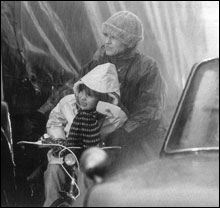 East Germany graced international screens most recently in the Euro-blockbuster Good Bye, Lenin! (2003). Iconic of millennial German Ostalgie (nostalgia for the old East Germany), the film cast rising star Daniel Brühl as a TV technician who dupes his frail, socialist mother into believing that the German Democratic Republic still exists. The comedy is predicated on the son’s quest to procure the provincial pickles and unfashionable clothes vanishing as the two Germanys prepare to unite.
East Germany graced international screens most recently in the Euro-blockbuster Good Bye, Lenin! (2003). Iconic of millennial German Ostalgie (nostalgia for the old East Germany), the film cast rising star Daniel Brühl as a TV technician who dupes his frail, socialist mother into believing that the German Democratic Republic still exists. The comedy is predicated on the son’s quest to procure the provincial pickles and unfashionable clothes vanishing as the two Germanys prepare to unite.
Whether one views Good Bye, Lenin! as a serious contribution to post-Communist memory or simply a slick attempt to market Ostalgie, it does correctly analyze the East German condition as a function of material culture and generational tension. The remarkable selection of oppositional and banned GDR films that will screen over the next two weeks at the Harvard Film Archive confirms that the downfall of real, existing Communism in Germany came about more because of bananas and blue jeans — and the resulting discord between children and their parents — than from ideological shortcomings.

DEFA, the state film company, was itself riddled with generational imbalance. Filmmakers in the GDR, often 40 before being allowed to direct their first feature, usually had to cut their teeth on the so-called anti-fascist film, a state-sanctioned genre of historical films that depicted Communist victimhood at the hands of the Nazis, often at the expense of ignoring the Jewish Holocaust. Although many of these films were routine exercises, two examples stand out for the way in which they deploy a modernist æsthetic drawing on international cinematic traditions.
A rare film shown in a beautiful new print, Das zweite Gleis|The Second Track (1962; February 19 at 9 pm) might have been Sam Fuller’s first feature had he grown up in Dresden or Rostock. Station inspector Brock witnesses a robbery but fails to report the culprit; instead he requests a transfer to another post. His daughter grows suspicious and begins to investigate her family’s past. Joachim Kunert’s film is a landmark for its frank portrayal of East German complicity in Nazi crimes, but also for canted shots used for psychological effect. Uncanny touches, such as lightly suggested incest, borrow from the vernacular of Hollywood’s subversive Europeans: Sirk, Preminger, Wilder.
Gerhard Klein’s Der Fall Gleiwitz|The Gleiwitz Case (1961; February 12 at 7 pm) is an Alain Resnais art film parading in anti-fascist uniform. Reconstructing the Nazis’ staged attack on a border radio transmitter by which Hitler excused his occupation of Poland, Klein uses narrative abstraction and formal rigor to estrange the past. The camera obscures or removes faces completely, transmitting evil as a synecdoche of hands, buttons, and bells. Klein’s montage at times echoes Eisenstein, at others parodies Leni Riefenstahl, or subscribes to the European ’60s code of successively radical changes in shot lengths. With documentary footage, icy overdubs, and Hanns Eisler’s allusive score, Der Fall Gleiwitz disjoints image and sound. Too radical for the authorities, it quickly disappeared from cinemas.
Klein had already achieved popular success with Berlin — Ecke Schönhauser|Berlin — Schönhauser Corner (1957; February 11 at 9 pm), a portrait of the city’s youth culture where he transcribes everyday socialism and its discontents into a subtle but effective cinematic language. In the first sequence, a young man runs through Checkpoint Charlie into Soviet-controlled East Berlin. Klein’s camera lingers on a sign that reads “Entering the Democratic Sector of Berlin”; this easy passage between sectors belies the economic division of the city and growing Cold War suspicions. With location shooting in and around the dark courtyards of Prenzlauer Berg as well as a striking sequence in the West Berlin Zoo station, Klein relays a city of disaffected and displaced youths in the local dialect; the jouissance that leads the young men to emulate Marlon Brando and pilfer Western currency is taken seriously. Recalling such West German vehicles as Die Halbstarken, not to mention contemporary American and British teenage dramas, Klein’s tale of transit denied epitomizes the postwar generation’s preference for make-up and motorcycles as their parents faced the nuclear age.
The teddy boys may have grown up and the poodle-skirt girls may have had babies of their own, but the figures in Jahrgang ’45|Born in ’45 (1965; February 18 at 7 pm + February 21 at 9 pm) retain their ennui. Artist and documentarian Jürgen Böttcher’s only feature harnesses the tone and creative energy of the early Godard and contemporary West German sex comedies (Zur Sache Schätzchen). Rolf Römer and Monika Hildebrand are perfectly cast as twentysomethings full of creativity but bored by another generation’s lethargic utopia. Sexual frankness and allegorical suggestiveness led censors to ban the film after viewing the rough cut. Reconstructed in 1990, Jahrgang ’45 suggests an East German auteurist cinema of international standard. Seen retrospectively, Böttcher’s jump cuts and his characters’ aimless musings seem sincere devices meant to rebel against Hollywood conventions rather than mere postmodern cynicism, as they have come to be in the age of Tarantino. Real-time scenes on the subway and at a supermarket document an East Berlin with the possibilities of New Wave Paris — even if always stifled by a layer of totalitarian white noise.